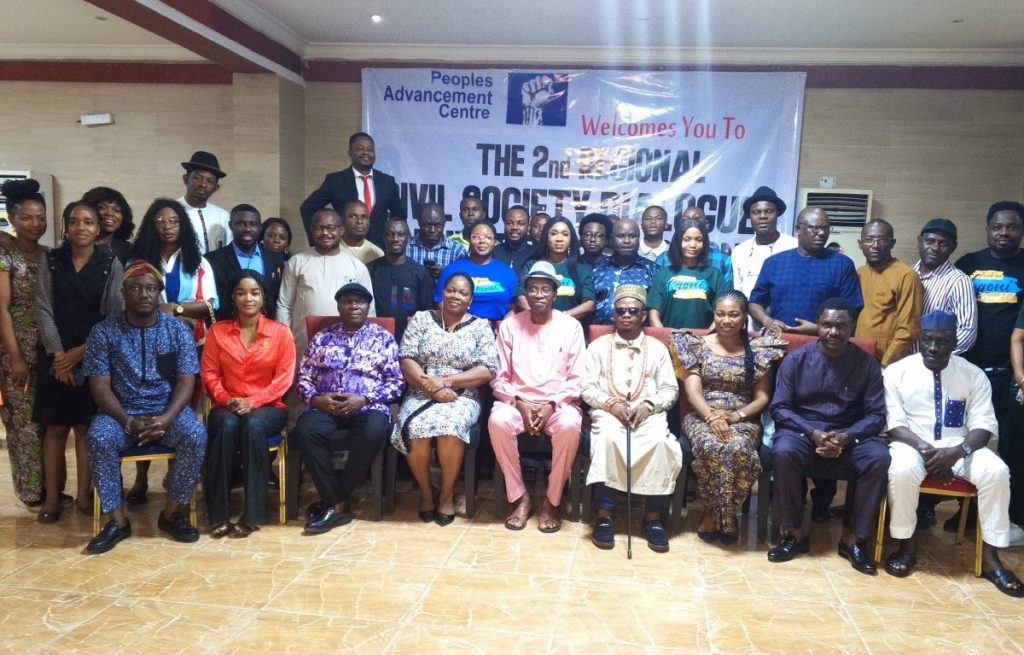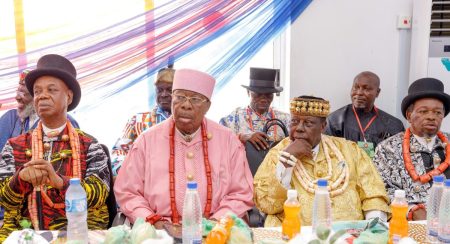
– Say delay in oil spill cleanup worsening environmental crisis
Mkpoikana Udoma
Port Harcourt — Environmental experts and stakeholders have raised the alarm over the escalating environmental crisis in the Niger Delta, warning that every day of delayed oil spill cleanup deepens the region’s environmental destruction.
Executive Director, Health of Mother Earth Foundation, HOMEF, Dr. Nnimmo Bassey,
stressed that even a single litre of crude oil can contaminate up to one million litres of water, and the longer spills remain untreated, the more severe and widespread the damage becomes.
Bassey speaking at the 2nd Regional Civil Society Dialogue on HYPREP and Ogoni held in Port Harcourt, criticized the insufficient funds allocated for cleanup efforts, comparing the $1 billion earmarked for the Ogoni cleanup to the over $60 billion spent on the Gulf of Mexico oil spill.
“We cannot ignore even the smallest oil spill. Studies have shown that one litre of crude oil can contaminate one million litres of water. Every delay deepens the problem. The long-term consequences of neglecting these spills can be severe, with pollution sinking deep into the ground—sometimes reaching depths of 5 to 10 meters—posing significant risks to local ecosystems and communities.
“The situation in Nsisioken, Eleme, where contamination has affected underground water sources, serves as a stark reminder of the lasting damage oil spills can inflict if not addressed swiftly.
“While the $1 billion recommended by UNEP was intended for the first five years of the Ogoni cleanup, it remains far from adequate to restore the entire Ogoni environment.”
He further called for “resource democracy” in the Niger Delta region, stressing that local communities must have the power to decide how their natural resources are managed
“And so there must be resource democracy for communities. The communities must have the right to have a say and decide what they want to do with the natural resources in their domain. Whether they want the resources to be extracted or left alone, as well as who and how these resources should be extracted.”
Speaking earlier, HYPREP Project Coordinator Professor Nenibarini Zabbey, emphasized the importance of partnership and collaboration in the ongoing Ogoni cleanup efforts, noting that
HYPREP was already undertaking numerous projects beyond what was initially outlined in the UNEP Report
Zabbey, represented by HYPREP Team Lead, Communications Unit, Mr. Kpoobari Nafo, urged civil society groups and community leaders to work closely with HYPREP, pointing out that the project’s success relies not only on identifying challenges but also on offering constructive solutions.
“We are not claiming perfection, but if there are areas where we fall short, we want you to point them out and, more importantly, help us find solutions. Together, as partners, we can make this work.
“This cleanup is a journey, not an instant fix. It will take time, and it is important to help the Ogoni people understand that results cannot be achieved overnight. Civil society’s role in managing these expectations will be vital.”
Also, Comrade Celestine Akpobari, a leading civil society advocate and member of HYPREP Governing Council, raised serious concerns over the planned resumption of oil production in Ogoni after 31 years, warning that it threatens the long-term sustainability of environmental recovery efforts.
Akpobari pointed out the inherent contradictions in reopening oil wells while simultaneously attempting to clean up decades of environmental damage caused by the oil industry and likened the situation to “opening the tap and pretending to mop the floor.”
Drawing on past failures of government-led initiatives like the Niger Delta Development Commission, NDDC, Akpobari criticized the lack of proper oversight, highlighting the corruption and mismanagement that has undermined development projects in the region.
He specifically referenced the NDDC’s $40 billion budget, with leaked reports revealing that over 12,000 of 13,777 planned projects were abandoned or non-existent.
With the theme of the dialogue focused on “Ogoni Beyond Oil,” Akpobari explored the future of the region once the oil reserves are exhausted, and harped on the need for Ogoni communities to transition away from oil dependency, emphasizing the challenges posed by entrenched entitlement mentalities, land scarcity, and environmental degradation.
He warned that any efforts to reopen oil production without fully addressing these issues would only exacerbate the Ogoni struggle.
“The Ogoni people cannot afford to return to the same destructive cycle of oil extraction without a real commitment to environmental restoration and community development,” Akpobari said, stressing that the future of the region lies in sustainable practices, not continued oil exploitation.



